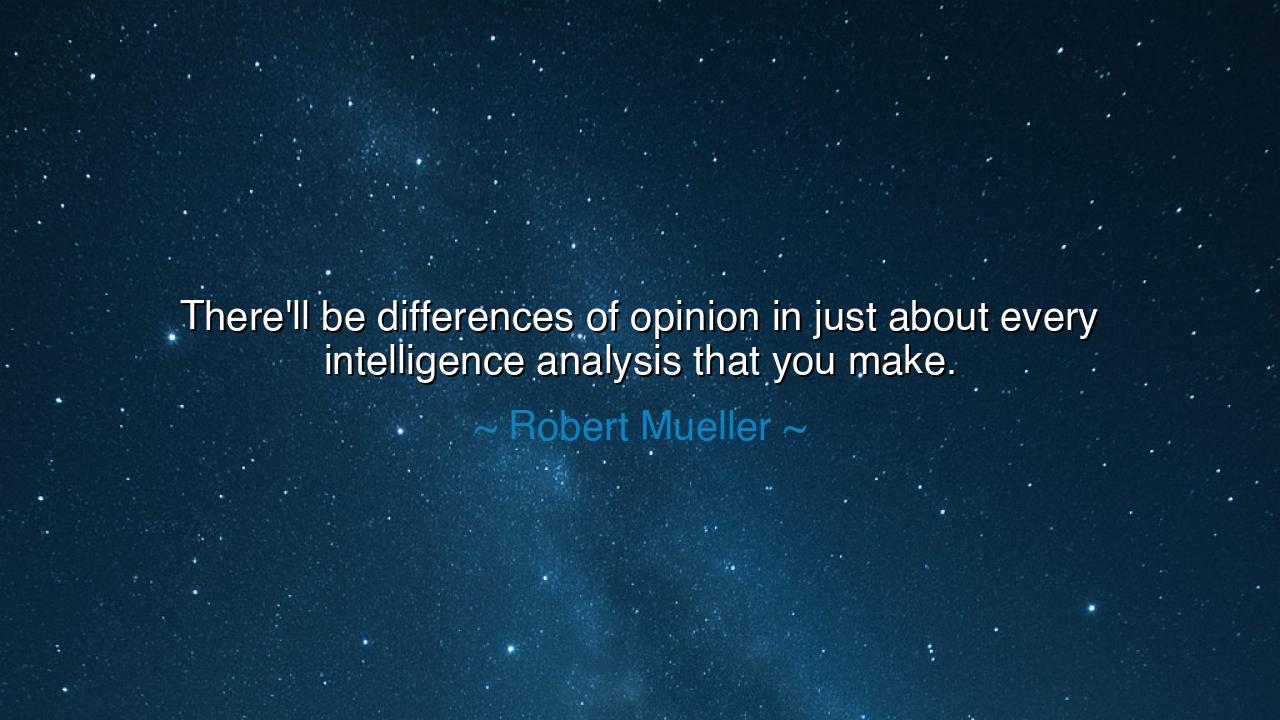
There'll be differences of opinion in just about every
There'll be differences of opinion in just about every intelligence analysis that you make.






In the pursuit of truth and understanding, there exists a timeless and unavoidable truth: there will always be differences of opinion. The words of Robert Mueller, “There'll be differences of opinion in just about every intelligence analysis that you make,” remind us that knowledge, no matter how meticulously gathered, is inherently subject to interpretation. In the ancient world, wisdom was not simply about finding one singular truth, but about navigating the complexity of perspectives, understanding that each person’s experience and perception colors the way they see the world. Mueller’s insight into the nature of intelligence analysis reflects this age-old reality: the truth is often multifaceted, and it is in the disagreement and debate that we refine our understanding.
Consider the story of Socrates, the ancient philosopher who, through his method of dialogue and questioning, uncovered the many layers of truth. Socrates did not believe that any single person could claim to possess absolute knowledge, but rather that truth is a collaborative endeavor, shaped by the insights and disagreements of many. Each person, in their individual perspective, holds a piece of the puzzle, and it is only through the exchange of ideas and debate that we come closer to a more complete understanding. Mueller’s statement reflects this wisdom, reminding us that differences of opinion, rather than being seen as obstacles, are in fact catalysts for deeper insight and clarity.
In the ancient courts of kings and emperors, decisions were often based not on the advice of a single trusted advisor, but on the council of many voices. Take, for example, the Roman Senate, where the future of the empire was shaped by debates among senators with differing views. While Julius Caesar was ultimately driven by his vision of conquest, it was the Senate’s opinions—often contentious and full of disagreement—that helped him solidify his strategies. In a similar way, intelligence analysis in the modern world benefits from diverse perspectives, as each analyst contributes their own interpretation of data, ultimately leading to a more nuanced and comprehensive understanding.
The Wars of the Roses, a period of violent political upheaval in medieval England, offers another example of how differences of opinion can shape history. The English nobles, each with their own vision for power, contested not only for political control, but also for differing interpretations of the rightful ruler. These clashes, rooted in personal ambition and competing ideologies, illustrate how differing perspectives can drive nations into conflict, yet also drive progress when reconciled. In the intelligence community, as Mueller suggests, differing opinions can serve as a powerful tool—questioning, challenging, and ultimately refining strategies for the common good.
Mueller’s statement also calls upon the minds of those who analyze intelligence to embrace the complexity of their work. It is easy to assume that facts are objective and clear-cut, but history teaches us that truth is often far more elusive. The very nature of intelligence is that it is often incomplete, fragmented, and open to interpretation. Much like the ancient art of storytelling, where myth and history blend to form a narrative that speaks to the human condition, so too does intelligence analysis weave together fragments of data, shaping them into a coherent understanding—always with room for disagreement and debate.
The true lesson from Mueller’s words lies in the value of diversity of thought. In every field, from politics to business, from warfare to science, the best decisions come not from a singular perspective, but from the melding of many voices. Disagreement and debate are not signs of weakness, but of a dynamic process of growth. To reach a deeper truth, we must be willing to listen to differing opinions, engage in meaningful dialogue, and refine our own understanding through the exchange of ideas.
In your own life, whether in your personal relationships, your career, or your pursuit of knowledge, remember that disagreement is not a barrier to progress, but a tool for refinement. Seek out diverse opinions and be willing to challenge your own assumptions. Like the great thinkers of the ancient world, embrace the complexity of the human experience, knowing that truth is rarely simple and always evolving. Just as in the field of intelligence, where differing viewpoints lead to a clearer picture of reality, in your own life, it is through the exchange of ideas, the embrace of disagreement, and the willingness to grow that you will find your path forward. Knowledge, after all, is not a fixed destination—it is a journey shaped by the voices of many.






AAdministratorAdministrator
Welcome, honored guests. Please leave a comment, we will respond soon